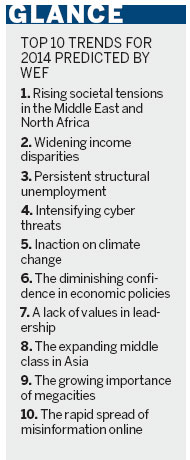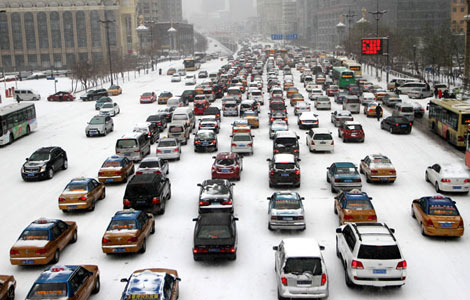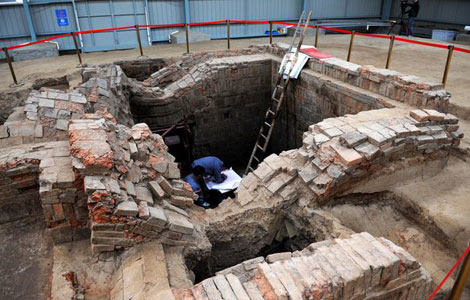Asia's middle class a trend for 2014
Updated: 2013-11-18 11:24
By Amy He in New York (China Daily USA)
|
||||||||

Rising societal tensions in the Middle East and North Africa is ranked as No 1 among the 10 most globally significant trends for 2014 in the annual report released on Friday by the World Economic Forum (WEF), which placed the growth of Asia's middle class as number eight.
Compiled from responses of 1,592 experts in 112 countries and entitled Outlook on the Global Agenda 2014, the list ranks widening income disparities as number two, persistent structural unemployment as number three and "the rapid spread of misinformation online" number 10.
Experts from the WEF's Network of Global Agenda Councils and other organizations agreed that an expanding middle class in Asia will do much to determine global economic growth. There is a "greater hope for increased prosperity," but Asia also faces environmental and resource challenges, according to the report.
"The explosion of Asia's middle class is stunning," wrote Kishore Mahbubani, the dean of the Lee Kuan Yew School of Public Policy at the National University of Singapore, in his analysis in the report.
The middle class will grow to 1.75 billion people by 2020, a number triple the current size of 500 million, Mahbubani noted.
"The world has never seen anything like this before; it's probably one of the biggest seismic shifts in history," he wrote.
The reason for Asia's success is through implementation of important reforms - free-market economics, meritocracy, rule of law and others - and these reforms do much to raise the living standards in Asia, Mahbubani wrote. "In China, for example, since initiating market reforms, more than 600 million people have been rescued from absolute poverty," he wrote.
Changes to the Asian middle class have led to "reduction of conflict within the region," and though Asia has yet to achieve the Western European standard of zero war prospects between neighboring states, a growing middle class traditionally leads to a reduction of the prospect of war, Mahbubani wrote.
But the big concern about environmental impact from the rise of the middle class remains, he wrote, adding that if the Asian middle class "all aspire to Western living standards through the Western model, the strain placed on our global environment could prove disastrous."
The explosion of the middle class cannot be stopped, he added, so countries need to pay attention to the environmental impact of this growth. "Asian leaders recognize they have to do something in this arena. But in terms of solutions it's also important for the developed countries to lead by example," Mahbubani wrote.
"This is a big challenge for long-term policy thinkers - if you want the likes of China to emerge as a responsible stakeholder and one that pays attention to the global environment, you have to show the way through deeds, not words."
What is needed, Mahbubani wrote, is an "incredible amount of brainpower," such as the studying and implementing of green technology ideas by the growing middle class.
amyhe@chinadailyusa.com
(China Daily USA 11/18/2013 page2)
- The US should rethink its role in Asia
- Russia continues pivot to Asia-Pacific
- Art Taipei 2013: longest-running art fair in Asia
- Biden to emphasize Asia pivot on tour
- BASF unveils Asia-Pacific investment plan
- Biden headed to East Asia
- Character chart to help tourists visit East Asia
- China calls for joint efforts for Asia-Pacific development
- BASF unveils Asia-Pacific investment plan
- At least 29 killed in train collision in Egypt
- Kerry to visit Israel to discuss Iran deal
- 100 killed in tribal clashes in Sudan
- Commonwealth urges for inclusive growth
- Hot air balloons take off at Int'l Balloon Festival
- 5 foreigners, including 3 Chinese, missing in furnace blast in E. India: official
Most Viewed
Editor's Picks

|

|

|

|

|

|
Today's Top News
Reforms will tighten Sino-US links: Xi
PM Abe busy in ASEAN blitz aimed at Beijing
Asia's middle class a trend for 2014
Bringing China's best minds home
 SAP innovates for China
SAP innovates for China
China forum explores startup landscape
End of laojiao to take time
Leadership's calls for reform hailed
US Weekly

|

|














